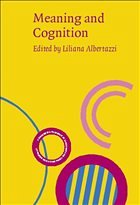Main description:
The aim of this book is to present significant aspects of cognitive grammar by adopting an interdisciplinary approach. The book provides an interplay of contributions by some exponents of cognitive grammar (Langacker, Croft, Wood, Geeraerts, Kövecses, Wildgen), and philosophers of language (Albertazzi, Marconi, Peruzzi, Violi) who, in most cases, share a phenomenological and Gestalt approach to the problem of semantics.
The topics covered include themes that are central to the debate in cognitive grammar, such as, metaphor, construal operations, prototypicality, Gestalt schemes and field semantics. The book offers evidence to support the cognitive hypothesis in semantics and the existence of a close connection between the structures of perception and the categories of natural language.
Because of the approach employed, with its consideration of borderline aspects among semantics, linguistics, theoretical reflection and historical analysis, the book marks out a route for a philosophical inquiry complementary to a cognitive approach to the semantics of natural language.
Table of contents:
- Which semantics?
- Why a mind is necessary
- What is Montague semantics?
- Construal operations in linguistics and artificial intelligence
- Salience phenomena in the lexicon
- Prototypicality, typicality, and context
- Directions and perspective points in spatial perception
- Force and emotion
- The geometric roots of semantics
- The history and future of field semantics
- Notes
- References
- Glossary
- Name index
- Subject index
The aim of this book is to present significant aspects of cognitive grammar by adopting an interdisciplinary approach. The book provides an interplay of contributions by some exponents of cognitive grammar (Langacker, Croft, Wood, Geeraerts, Kövecses, Wildgen), and philosophers of language (Albertazzi, Marconi, Peruzzi, Violi) who, in most cases, share a phenomenological and Gestalt approach to the problem of semantics.
The topics covered include themes that are central to the debate in cognitive grammar, such as, metaphor, construal operations, prototypicality, Gestalt schemes and field semantics. The book offers evidence to support the cognitive hypothesis in semantics and the existence of a close connection between the structures of perception and the categories of natural language.
Because of the approach employed, with its consideration of borderline aspects among semantics, linguistics, theoretical reflection and historical analysis, the book marks out a route for a philosophical inquiry complementary to a cognitive approach to the semantics of natural language.
Table of contents:
- Which semantics?
- Why a mind is necessary
- What is Montague semantics?
- Construal operations in linguistics and artificial intelligence
- Salience phenomena in the lexicon
- Prototypicality, typicality, and context
- Directions and perspective points in spatial perception
- Force and emotion
- The geometric roots of semantics
- The history and future of field semantics
- Notes
- References
- Glossary
- Name index
- Subject index

